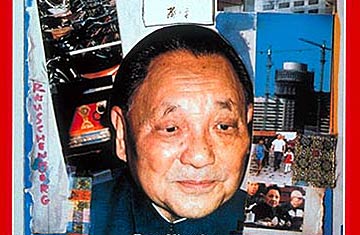
(3 of 17)
There was no such progress in other familiar trouble spots. South Africa was torn by unremitting violence as blacks demanded abolition of apartheid and whites were willing to accept only gradual change. Guerrilla wars in Central America raged unchecked, and the so-called peace process in the Middle East made no discernible headway. Nature joined politics in contributing to human misery as earthquakes in Mexico City, a volcano eruption in Colombia and a cyclone in Bangladesh claimed tens of thousands of victims. In the U.S., Reagan became the first President to confer the full powers of his office voluntarily on his Vice President, George Bush, though only for eight hours, while surgeons removed a cancerous growth from Reagan's colon. The President recovered quickly and apparently completely, but apart from the summit his political momentum seemed to wane. Reagan's success in pushing a tax-reform bill through the House at year's end demonstrated that he is hardly a lame duck yet. Nonetheless, whether he can win a final bill at all close to his desires--or indeed any bill--is one of the major questions of 1986. Spy scandals, headed by the exposure of the Walker-family espionage ring, proliferated as rarely, if ever, before. The scare of the year was medical: the spread of AIDS touched off public anxiety and hysteria far beyond anything warranted by the facts, though the facts were surely grim enough. Of 15,775 people who had caught the disease, 8,122 were known to have died.
Of all these turbulent and momentous events and phenomena, however, only the ascension of Gorbachev to the Soviet leadership could eventually rival for long-range importance to the world the sweeping changes Deng is pushing through in China. But for all the panache he displayed on taking power and all the headlines and television time he and Reagan commanded at the summit, Gorbachev's impact on history by year's end was still far more potential than actual. The freshness and vigor of his personal style far outweighed the importance of any changes he had made in Soviet foreign or domestic policy. Indeed, though Gorbachev, like Deng, has made pepping up his country's economy and improving the material lives of its citizens his top priority, the caution of Gorbachev's opening moves only highlights by contrast the far more radical and fundamental nature of the reforms Deng has already carried out in China. Says Richard Holbrooke, who was U.S. Assistant Secretary of State for East Asian Affairs when Washington restored full diplomatic relations with China in 1979: "There is no other leader in the world who is doing anything even remotely in Deng's league."
Gorbachev, Deng and the heads of almost every Marxist country face the same fundamental problem. In a 1984 interview with the Italian Communist daily L'Unità, Hu Yaobang, General Secretary of the Chinese Communist Party, phrased it this way: "Since the October Revolution [of 1917, which enthroned Soviet Marxism], more than 60 years have passed. How is it that many socialist countries have not been able to overtake capitalist ones in terms of development? What was it that did not work?"
